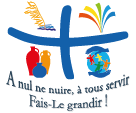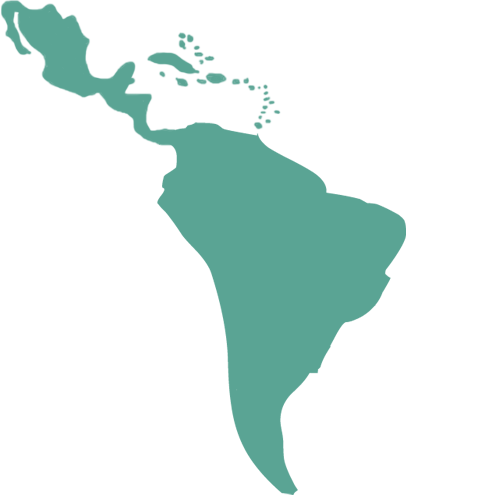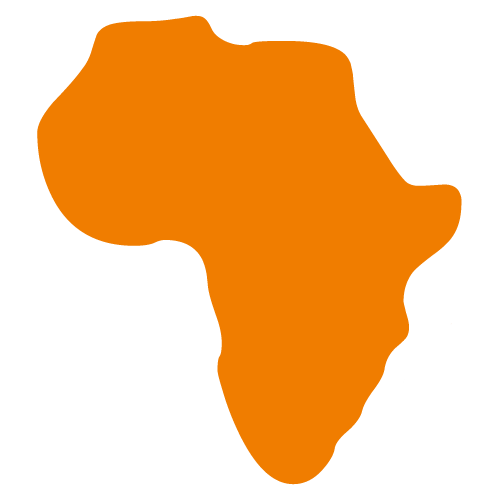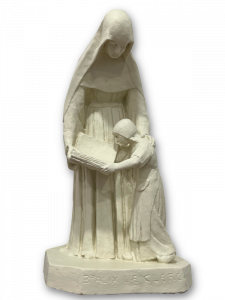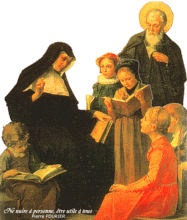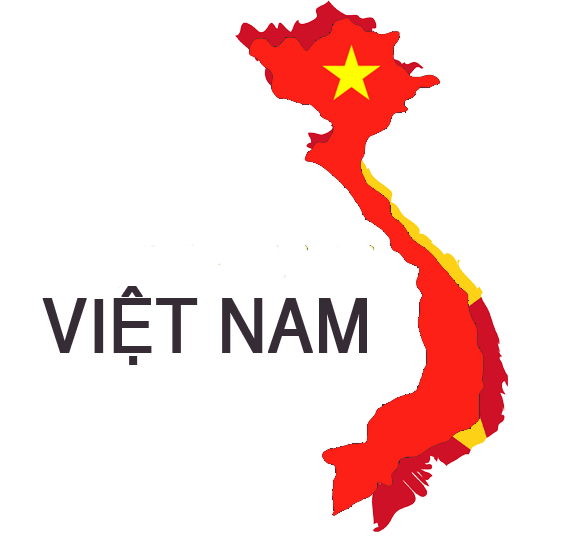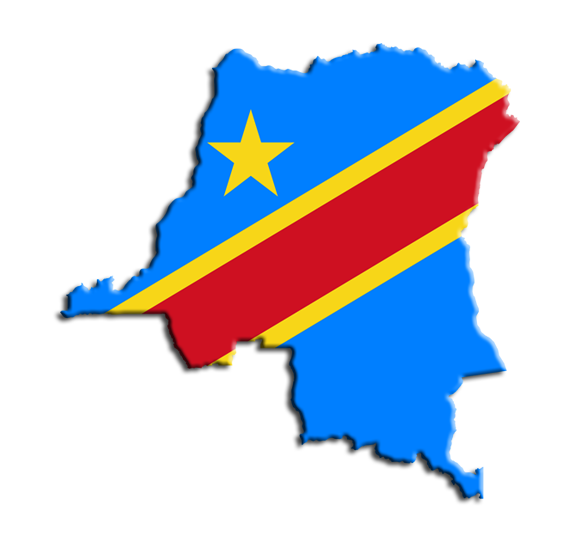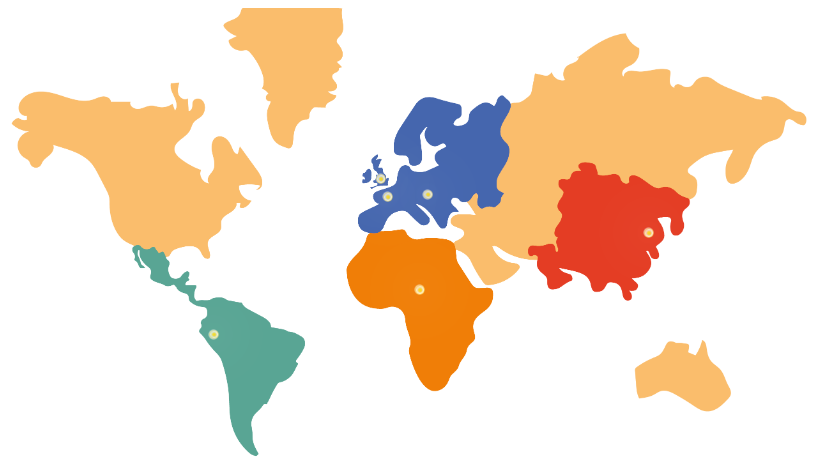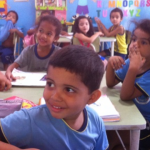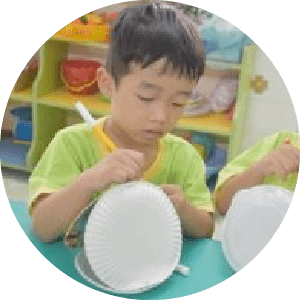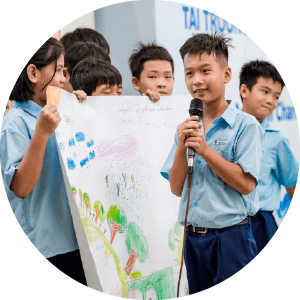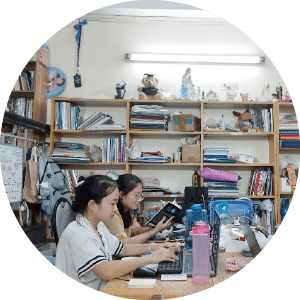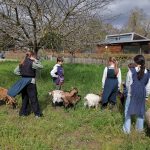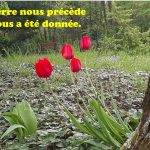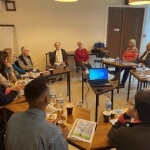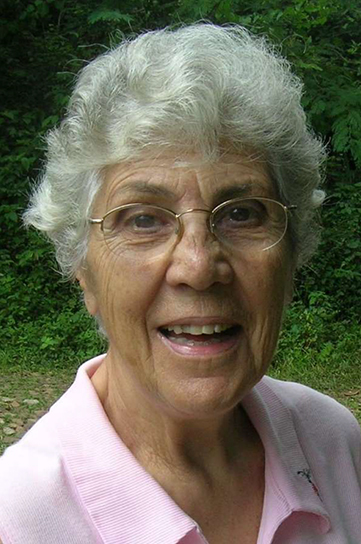
Isabel Sofia De Siqueira
• 28/07/1930 + 01/02/ 2022
Sister Isabel Sofia – Maria Teresa Ferreira Pinto de Siqueira – was born in the village of Obidos, in Portugal, on 28th July 1930. She grew up surrounded by a vineyard, “Quinta das Gaieiras”, belonging to the family of her mother, Dona Maria Eugenia. The Quinta de Baixo belonged to her own parents. Her father, Dom Jose de Siqueira, was a composer of fado, a tradition in her family, and from the age of 11 Maria Teresa already used to sing for charity evenings, a fado singer recognised for the maturity and beauty of her voice. Until she was 12, living on a rural farm, she was taught at home and in a neighbouring village, learning Portuguese and English.
During the second world war, our sisters from the Union of Jupille, in Belgium, where the international noviciate was situated, afraid of a German invasion, decided that the noviciate, comprising young Germans and Italians and other nations opposed to Germany and Italy, should flee to Portugal, a neutral country. They hoped to travel onwards to Brazil and avoid the war zone. It was a long and difficult journey, and when they at last arrived in Portugal in the second half of 1942,Brazil had joined the war on the side of the Allies and it was impossible to cross the Atlantic. The Duchess of Palmela, who knew the sisters, gave them her summer palace, Paco do Lumiar, in Lisbon, very roomy, at the time unoccupied, but in a bad state (it now houses the Museum of Clothing).
As they could neither return to Jupille nor continue their journey, in order to survive until the end of the war they restored a part of the palace as well as they could and opened a boarding school for girls, with all the teaching in French. Maria Teresa’s family decided to send their daughters to the Belgian sisters’ school, so that they could learn French. After the war, the sisters either went back to Belgium or travelled on to Brazil. Maria Teresa, who had been very happy at school there, decided to continue her education in the convent at Jupille. She spent two years in Belgium and went back to Portugal when she was 18, then spent two years deciding on her vocation. Finally she decided to enter the Congregation and so for a long time was the only Portuguese sister in the Canonesses. Maria Teresa took the habit and the name of Isabel Sofia, after her much loved older sister.
After her noviciate she was sent to Louvain, where she followed a course in Philosophy and Theology for religious for two years. Then she was sent to our school at Dijon in France , where she began to teach.
During the 1950s, education in Brazil was rethought. The movement “Escola Nova” tried to renew Brazilian education, following European and American interactive methods. The Brazilian Vicariate wanted to take part in this project of educational renewal in our own schools, and asked the Congregation to send a sister with the appropriate formation to Brazil. Sister Isabel Sofia had already expressed a desire to go to Brazil so the Congregation sent her to Paris where for two years she studied in the Centre for Educational Method, specialising in the Montessori- Lubienska method, guided by Father Pierre Faure S.J. In December 1958 Sr. Isabel Sofia at last arrived in Brazil to begin experimental classes in the Colegio de Santo Agostinho in São Paulo. She was responsible for the formation of many educators all over Brazil using the new interactive methods. The courses began in the Colegio Madre Alix and the Colegio Nossa Senhora do Murumbi and then spread throughout the country.
Shortly after having celebrated her silver jubilee in the Congregation, in 1978, Sr. Isabel Sofia was elected General Councillor. She spent 6 years in the Generalate travelling the world, and over and above the tasks fulfilled in the service of the Generalate, encouraged interactive methods both in educational and pastoral work. When she left the General Council in 1984, Sr. Isabel Sofia had already made a decision to work with the poor, so joined Sr. Sueli and Sr. Valeria who were already working in the Guarabira diocese, in the state of Paraiba.
In order to help the Base Communities, Sr. Isabel Sofia discovered the CEBI, the Ecumenical Centre for Biblical Studies, and became very enthusiastic about accessible reading of the Bible. She discovered in the CEBI the method of Biblical Drama, to emphasise the gospel values already present in peoples’ lives, and integrated this with her experience of interactive education. She concentrated on this in the Guarabira diocese. She travelled throughout Brazil and other countries, including Cuba, educating other teachers of Biblical Drama, drawing on her own experience. In the Brejo da Paraiba region, she ran a biblical course for years on the Clube de Guarabira radio station. Elected to the national co-ordinating body of the CEBI, at the same time as Sr. Valeria took on the running of the School of Formation “Quilombo dos Palmares”, they considered their work in Guarabira finished when there were several people trained to continue that method of education. Then they decided to move to a larger town with easier communication and transport. That is how the first community at João Pessoa began, in which Sr. Maria das Graças, Sr. Cecilia Maria and Sr. Gê spent years doing social and apostolic work. From João Pessoa Sr. Isabel Sofia spent several years working with the CEBI to educate young people and groups to spread accessible biblical study throughout Brazil.
This continued until 1996 when she was re-elected to the General Council. She left the Generalate 6 years later, in 2002. At João Pessoa again she took up her work in forming educators in Portuguese, preparing university students in the parish of Jesus Ressuscité. Participants in these courses included both young Haitians and young Africans.
Sr. Isabel Sofia gave herself totally to her work and all those who knew her were struck by her joie de vivre, and owe her a debt in their progress in their studies, for her work in communities and her devotion to her brothers and sisters. We are still discovering the depth and scope of the education Sr. Isabel Sofia gave to all those who met her.
Sr M. Valeria Rezende
